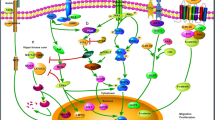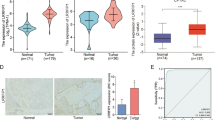Abstract
Golgi phosphoprotein 3 (GOLPH3) is recently demonstrated to function as an oncogene involved in the development and progression of cancers. However, little is known about GOLPH3 expression and its clinical significance in hepatocellular carcinoma (HCC). The levels of GOLPH3 messenger RNA (mRNA) and protein in HCC cell lines and fresh tissues were determined by quantitative RT-PCR and western blotting. Additionally, the protein expression of GOLPH3 was detected in 167 paraffin-embedded HCC samples by immunohistochemistry. GOLPH3 mRNA and protein was overexpressed in HCC cell lines and tissues than the immortalized normal hepatocyte cell line LO2 and the adjacent nontumorous live tissues, respectively. High GOLPH3 expression was positively correlated with high serum AFP level (P = 0.015) and more tumor recurrence or metastasis (P = 0.010). In addition, HCC patients with high GOLPH3 expression had poorer overall survival (hazard ratio (HR), 1.87; 95 % confidence interval (CI), 1.19–2.94; P = 0.006) and poorer disease-free survival (HR, 1.90; 95 % CI, 1.21–2.98; P = 0.005) than those with low GOLPH3 expression. The cumulative 5-year survival rate was only 35.19 % (95 % CI, 26.18–44.20 %) in the high GOLPH3 expression group, whereas it was 55.93 % (95 % CI, 43.26–68.60 %) in the low GOLPH3 expression group. Furthermore, multivariate Cox regression analysis demonstrated that the expression of GOLPH3, tumor size, and tumor multiplicity were independent prognostic predictors for HCC patients. GOLPH3 was overexpressed in HCC at both the mRNA and protein levels, and high expression of GOLPH3 could be served as a novel and potential prognostic biomarker for HCC patients.




Similar content being viewed by others
References
Jemal A, Bray F, Center MM, Ferlay J, Ward E, Forman D. Global cancer statistics. CA Cancer J Clin. 2011;61:69–90.
He J, Gu D, Wu X, et al. Major causes of death among men and women in China. N Engl J Med. 2005;353:1124–34.
Parkin DM, Bray F, Ferlay J, Pisani P. Estimating the world cancer burden: globocan 2000. Int J Cancer. 2001;94:153–6.
Llovet JM, Burroughs A, Bruix J. Hepatocellular carcinoma. Lancet. 2003;362:1907–17.
Bruix J, Sherman M. Management of hepatocellular carcinoma. Hepatology. 2005;42:1208–36.
Llovet JM. Updated treatment approach to hepatocellular carcinoma. J Gastroenterol. 2005;40:225–35.
Yang LY, Fang F, Ou DP, Wu W, Zeng ZJ, Wu F. Solitary large hepatocellular carcinoma: a specific subtype of hepatocellular carcinoma with good outcome after hepatic resection. Ann Surg. 2009;249:118–23.
Dragani TA. Risk of HCC: genetic heterogeneity and complex genetics. J Hepatol. 2010;52:252–7.
Farinati F, Marino D, De Giorgio M, et al. Diagnostic and prognostic role of alpha-fetoprotein in hepatocellular carcinoma: both or neither? Am J Gastroenterol. 2006;101:524–32.
Shen Q, Fan J, Yang XR, et al. Serum DKK1 as a protein biomarker for the diagnosis of hepatocellular carcinoma: a large-scale, multicentre study. Lancet Oncol. 2012;13:817–26.
Ji J, Shi J, Budhu A, et al. MicroRNA expression, survival, and response to interferon in liver cancer. N Engl J Med. 2009;361:1437–47.
Wu CC, Taylor RS, Lane DR, Ladinsky MS, Weisz JA, Howell KF. GMx33: a novel family of trans-Golgi proteins identified by proteomics. Traffic. 2000;1:963–75.
Dippold HC, Ng MM, Farber-Katz SE, et al. GOLPH3 bridges phosphatidylinositol-4-phosphate and actomyosin to stretch and shape the Golgi to promote budding. Cell. 2009;139:337–51.
Abraham RT. GOLPH3 links the Golgi network to mTOR signaling and human cancer. Pigment Cell Melanoma Res. 2009;22:378–9.
Scott KL, Kabbarah O, Liang MC, et al. GOLPH3 modulates mTOR signaling and rapamycin sensitivity in cancer. Nature. 2009;459:1085–90.
Scott KL, Chin L. Signaling from the Golgi: mechanisms and models for Golgi phosphoprotein 3-mediated oncogenesis. Clin Cancer Res. 2010;16:2229–34.
Kunigou O, Nagao H, Kawabata N, Ishidou Y, Nagano S. Role of GOLPH3 and GOLPH3L in the proliferation of human rhabdomyosarcoma. Oncol Rep. 2011;26:1337–42.
Li XY, Liu W, Chen SF, Zhang LQ, Li XG, Wang LX. Expression of the Golgi phosphoprotein-3 gene in human gliomas: a pilot study. J Neurooncol. 2011;105:159–63.
Zeng ZL, Lin HX, Zhao XH, et al. Overexpression of GOLPH3 promotes proliferation and tumorigenicity in breast cancer via suppression of the FOXO1 transcription factor. Clin Cancer Res. 2012;18:4059–69.
Li H, Guo L, Chen SW, et al. GOLPH3 overexpression correlates with tumor progression and poor prognosis in patients with clinically N0 oral tongue cancer. J Transl Med. 2012;10:168.
Hua X, Yu L, Pan W, et al. Increased expression of Golgi phosphoprotein-3 is associated with tumor aggressiveness and poor prognosis of prostate cancer. Diagn Pathol. 2012;7:127.
Wang JH, Chen XT, Wen ZS, et al. High expression of GOLPH3 in esophageal squamous cell carcinoma correlates with poor prognosis. PLoS One. 2012;7:e45622.
Hu BS, Hu H, Zhu CY, Gu YL, Li JP. Overexpression of GOLPH3 is associated with poor clinical outcome in gastric cancer. Tumour Biol. 2013;34:515–20.
Livak KJ, Schmittgen TD. Analysis of relative gene expression data using real-time quantitative PCR and the 2−ΔΔCT Method. Methods. 2001;25:402–8.
Yokoi S, Yasui K, Saito-Ohara F, et al. A novel target gene, SKP2, within the 5p13 amplicon that is frequently detected in small cell lung cancers. Am J Pathol. 2002;161:207–16.
Dowen SE, Neutze DM, Pett MR, et al. Amplification of chromosome 5p correlates with increased expression of Skp2 in HPV-immortalized keratinocytes. Oncogene. 2003;22:2531–40.
Gorringe KL, Boussioutas A, Bowtell DD. Novel regions of chromosomal amplification at 6p21, 5p13, and 12q14 in gastric cancer identified by array comparative genomic hybridization. Gene Chromosome Cancer. 2005;42:247–59.
Wullschleger S, Loewith R, Hall MN. mTOR signaling in growth and metabolism. Cell. 2006;124:471–84.
Sabatini DM. mTOR and cancer: insights into a complex relationship. Nat Rev Cancer. 2007;6:729–34.
Guertin DA, Sabatini DM. Defining the role of MTOR in cancer. Cancer Cell. 2007;12:9–22.
Acknowledgments
This work was supported by grants from the National Natural Science Foundation of China and the Hunan Natural Science Foundation. The funders had no role in the study design, data collection, analysis, decision to publish, or the preparation of the manuscript.
Conflicts of interest
None
Author information
Authors and Affiliations
Corresponding authors
Additional information
Guang-Sheng Hu and Ying-Qing Li contributed equally to this article.
Rights and permissions
About this article
Cite this article
Hu, GS., Li, YQ., Yang, YM. et al. High expression of Golgi phosphoprotein-3 is associated with poor survival in patients with hepatocellular carcinoma. Tumor Biol. 35, 8625–8632 (2014). https://doi.org/10.1007/s13277-014-2105-8
Received:
Accepted:
Published:
Issue Date:
DOI: https://doi.org/10.1007/s13277-014-2105-8




